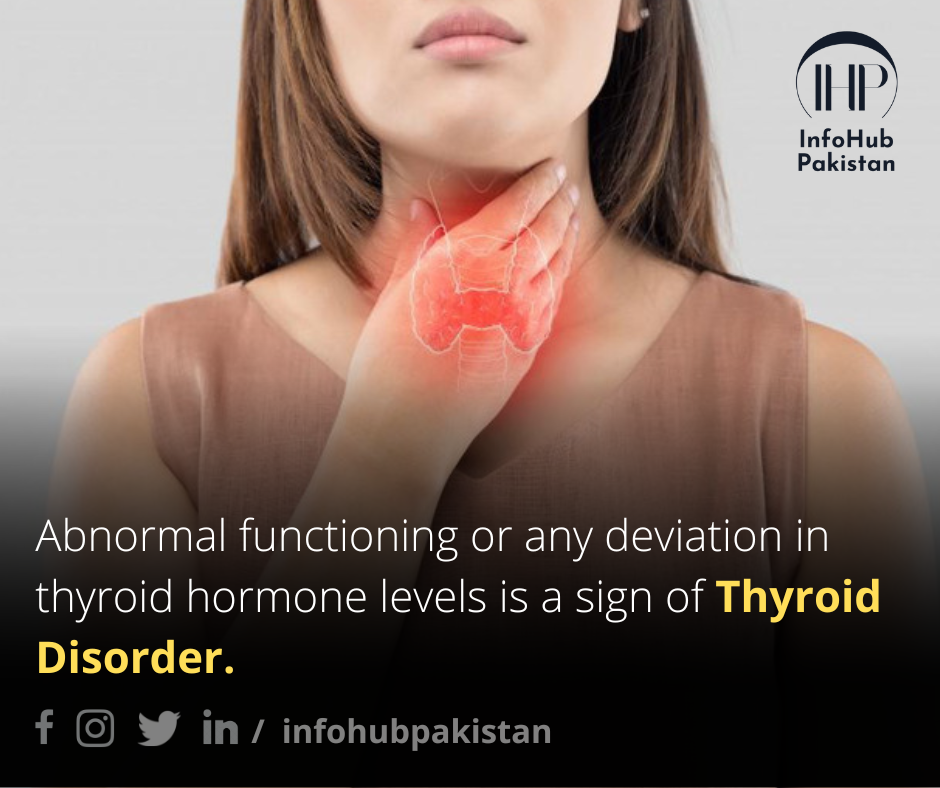
What are thyroid disorders?
What is thyroid?
The thyroid is a butterfly-shaped gland located in front of the windpipe in the neck. The function of the thyroid is to secrete hormones that change and regulate the functioning of the body. Thyroxine (T4) and triiodothyronine (T3) are thyroid hormones. These hormones are secreted by the thyroid gland directly into the blood and travel to various parts of the body. These hormones control the metabolic activities of the body.
What are thyroid disorders?
Abnormal functioning or any deviation in thyroid hormone levels is a sign of thyroid disorder. The main hormones used as indicators are.
- Thyroid Stimulating Hormone (TSH) – It is a hormone secreted by the pituitary gland (master gland) in the brain. The production of the thyroid hormones T3 and T4 is controlled by TSH. T3 and T4 in turn reduce the secretion of TSH.
- Thyroxine (T4) – It is one of the hormones secreted by the thyroid which regulates the basal metabolic rate as well as protein synthesis.
- Triiodothyronine (T3) – This acts in a similar way to T4 but is more potent and is secreted in smaller amounts.
How many types of thyroid disorders are there?

Thyroid disorders mainly fall under the broad term known as goiter. Enlargement of the thyroid gland is called goitre. It is classified as follows.
Simple (non-toxic) goiter – This is a benign enlargement of the thyroid gland without any change in the function of the gland, ie; It is in euthyroid state (functioning normally).
Types of common goiter –
- Diffuse hyperplastic (most common)
- Colloid goiter.
- Multilocular goiter.
Toxic goiter – It is associated with increased secretion of T3 and T4. Enlargement may or may not be present. The patient is in a hyperthyroid state (above normal functioning). The person shows symptoms of hyperthyroidism.
- Graves disease.
- Plummer’s disease.
- Toxic solitary nodule.
Neoplastic goiter – It is caused due to cancerous growth which can be benign or malignant.
- Malignant-carcinoma thyroid.
Thyroiditis – inflammation of the thyroid due to an autoimmune process, which causes hyper or hypo functioning of the thyroid gland.
- Hashimoto’s thyroiditis.
- De Curvain’s Thyroiditis.
- Riedel’s thyroiditis.
What are the causes of thyroid disorder?
Thyroid disorders can be due to the following reasons.
- iodine deficiency (most common)
- Consumption of goitrogens – are chemicals that inhibit the synthesis of thyroid hormones.
- Autoimmune – the body produces antibodies that overstimulate or inhibit the thyroid, causing hyperthyroidism or hypothyroidism, respectively
- exposure to radiation.
- Long-standing simple goiter: may undergo transformation into cancer.
- genetic susceptibility.
- Rare causes: due to bacterial infection or due to other diseases.
What are the symptoms of thyroid disorder?
Thyroid disorders can have the following symptoms.
- Painless swelling in the front of the neck.
- palpitations (hearing your own heartbeat)
- Irregularity of heart rhythm.
- tachycardia (high heart rate)
- Exophthalmos (protrusion of the eyeball)
- anxiety
- insomnia
- Depression
- menstrual cycle
- infertility
- Increase or decrease in basal metabolic rate due to weight loss or weight gain.
- Intolerance to changes in temperature.
- Due to compression- dyspnoea (breathlessness), dysphagia (difficulty swallowing), hoarseness of voice, fainting attacks.
What tests are done in case of thyroid disorders?
The basic test done to diagnose any thyroid disorder is known as thyroid profile. Thyroid profile includes the following tests.
- Thyroid Function Tests – Serum T3, T4, TSH
- Thyroid ultrasonography (USG)
- Thyroid CT scan or MRI.
- Serum long-acting thyroid stimulator (LATS) antibodies are seen in cases of Lats-Graves’ disease.
- Serum calcitonin : may be increased in carcinoma of the thyroid.
- FNAC – Fine Needle Aspiration Cytology is done to see the microscopic morphology of the cells which helps to diagnose the cancer as well as the type of cancer.
- X-ray of neck – extent of enlargement and effect of enlarged thyroid on surrounding structures and presence of calcifications (seen in CA thyroid)
- Chest X-ray – done to check for spread of cancer or extension of an enlarged thyroid into the chest cavity.
- Indirect laryngoscopy – to visualize the movement of the vocal cords (reduced movement in case of nerve compression)
What are the treatments for thyroid disorders?

The treatment of thyroid disorders depends on the type of disorder the patient is suffering from. The main lines of treatment for thyroid disorders are medical, surgical, hormonal, and radiation.
Simple (non-toxic) goiter –
- Medicine – Iodine Supplementation
- Surgical – subtotal thyroidectomy, in which both the lobe and the isthmus of the thyroid are removed, but some part at the junction of the trachea and esophagus is preserved.
Toxic goiter
- Medical – Antithyroid drugs that reduce the production of thyroid hormones.
- Radiation – radioactive iodine tablets help destroy thyroid tissue so that a euthyroid state can be achieved.
- Surgical – This is usually the last option when medical line and radiation therapy have failed. Either total thyroidectomy or subtotal thyroidectomy is performed.
Thyroid neoplasm
- Surgical – total thyroidectomy with central node compartment neck dissection. (Lymph nodes in the neck are removed)
- hormonal – high dose thyroxine; Suppresses TSH secretion to prevent further increase in size.
- Radiation – radioactive iodine. Radiation therapy for secondary.
- chemotherapy
Thyroiditis _
- Hormonal – L-thyroxine supplementation for the treatment of hypothyroidism.
- Medical – Steroid therapy to treat inflammation and reduce autoimmune antibodies.
- Surgical – Subtotal or hemi thyroidectomy is performed when the thyroid becomes too large or is compressing surrounding structures and causing discomfort to the patient.
What to eat and what not to eat in thyroid disorders?
There are no dietary restrictions when it comes to any thyroid disorder. The most important aspect is to have a balanced diet with nutritious foods along with adequate exercise. It is a supplement to the treatment given by the doctor and should not be used as a substitute for treatment. This helps in preventing further problems that may arise due to thyroid disorder. The only foods that may need to be avoided with any thyroid disease are foods containing goitrogens. Its role is explained in the reasons. There are foods containing goitrogens.
- Soy foods- tofu, soy milk, soybeans, etc.
- Cassava.
- Millet.
- Cruciferous Vegetables – Cabbage, Broccoli, Cauliflower etc.
These foods are only harmful in large amounts and are otherwise safe to eat.
Frequently Asked Questions About Thyroid Disorders?
What are the problems associated with an enlarged thyroid?
The symptoms associated with thyroid disorders are mentioned above. There are problems specifically arising from enlargement of the thyroid.
- Dyspnoea (breathlessness) due to compression of the trachea
- Dysphagia (difficulty swallowing) due to compression of the esophagus
- Hoarseness of voice due to compression of the laryngeal nerve (the nerve supplying the vocal cords).
- Fainting attack due to compression of the common carotid artery that carries blood to the brain .
Is thyroid disease incurable?
No, like any disease; Thyroid treatment is also possible. Thyroid can be treated with medicines, surgery etc. If there is a suspicion of any thyroid disease, it is necessary to consult a doctor immediately.
When should thyroid medicines be taken?
Thyroid tablet should be consumed in the morning on an empty stomach. Also, some people can consume this medicine 50 minutes before a meal.
What are normal levels of thyroid hormones?
- TSH – 0 to 5 IU/mL (international units per mL)
- T3 – 1.2 to 3.1 nmol/l (nanomole per liter)
- T4- 55 to 150 nmol/l
- Free T3 – 3 to 9 nmol/L
- Free T4 – 8 to 26 nmol/l
- (Note: Normal ranges vary from lab to lab)
What to do to eliminate thyroid disorders from the root?
Follow the instructions given by your doctor to eliminate thyroid from the root. Apart from this, the use of some home remedies can help in eliminating the thyroid from the root. It is important to complement the doctor’s treatment with maintaining a balanced diet and getting regular exercise. Do not try any other home remedies or medicines without doctor’s advice.
Does thyroid disease cause sore throat?
Yes, thyroid disease occurs due to disturbances in the thyroid gland. Other than this; This can be due to an imbalance in hormones, leading to symptoms such as sore throat, bloating and heaviness.
How is thyroid cancer?
The exact cause of thyroid cancer is not known, but an enlarged thyroid gland may increase the risk of cancer. The thyroid gland helps control heart rate, weight, and hormones. Thyroid cancer occurs when cells undergo mutations. Abnormal cells start to form tumors and abnormal cells can invade surrounding tissue. From here it starts spreading to other parts of the body. Thyroid cancer can be classified based on the type of cells found in the tumor.








